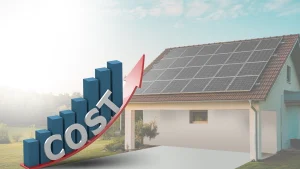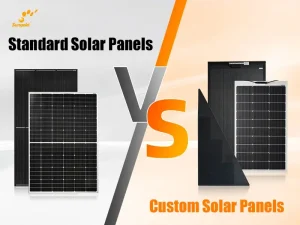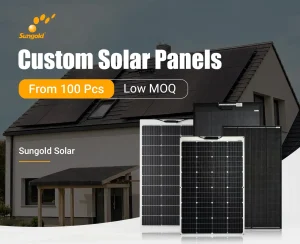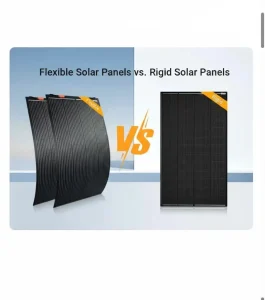As the pursuit of sustainable lifestyles continues to grow, Recreational Vehicles (RVs) have become an ideal choice for many European families and businesses exploring nature. Within an RV, a solar power system is a crucial clean, independent energy solution. It provides electricity for your journey, allowing you to enjoy convenience even when far from the grid. However, to maximize your green energy investment return, ensure the power generation efficiency of your RV solar panels, and extend their lifespan, regular cleaning is absolutely essential.
This article will delve into how to effectively clean your RV solar panels, incorporating Europe’s diverse climate—from rainy Northwestern Europe to sunny Southern Europe—to ensure your mobile home consistently has ample clean energy.
Why Should You Clean Your RV Solar Panels Regularly?
Cleaning your RV solar panels isn’t just about aesthetics; it’s fundamental for performance and return on investment.
- Boosting Power Generation Efficiency: Is Dirt Hindering Your Output? During your travels, your RV will pass through various environments. The surface of your solar panels can easily accumulate dust, pollen, leaves, bird droppings, industrial pollutants, and even road grime. These contaminants form a “barrier,” preventing sunlight from fully reaching the panels, leading to a significant decrease in power generation. This impact is particularly noticeable in urban areas with poorer air quality or near busy roads.
- Extending System Lifespan: Could Unseen Damage Be Shortening Your Panels’ Life? Dirt accumulation not only affects efficiency but can also cause hot spots on solar panels. These are areas where, due to obstruction, the temperature becomes excessively high, accelerating aging and potentially causing permanent damage. Long-term accumulation of debris, such as bird droppings or stubborn grime, is a primary cause of these damaging hot spots. Regular maintenance helps detect and resolve these potential issues early, preventing long-term damage and protecting your valuable investment.
- Maximizing Your Return on Investment: Are You Getting the Most from Your Green Energy? An efficiently operating RV solar system saves you more on campsite electricity fees, offering greater freedom during your travels and reducing reliance on external power sources. Ensuring your panels are clean means you’re getting full value from your green investment.
When and How Often Should You Clean Your RV Solar Panels?
Understanding the optimal cleaning times and frequency is key to maintaining your RV solar system’s efficient operation.
Optimal Cleaning Times: Is There a Best Time of Day or Weather?
- Time of Day: The best choice is early morning or late afternoon/evening. At these times, the sunlight is less intense, and the panel temperature is lower. This prevents water from evaporating too quickly and leaving water marks, while also reducing the risk of burns for the operator from hot panels.
- Weather Conditions: Choose clear weather with no wind or rain. Avoid cleaning in strong winds, thunderstorms, or freezing conditions, as this is not only unsafe but can also affect the cleaning results.
Cleaning Frequency: How Often Is Too Often, or Not Enough?
- General Recommendation: While choosing a Go Power Solar RV Kit helps to keep maintenance at a minimum, you can benefit from performance gains by regularly cleaning the solar panels. The reality is that wind will blow off loose particles and dust while driving, providing an inherent cleaning effect. The same applies to rain; it washes down the panels, rinsing away dirt that may have built up. However, for optimal performance, a bi-annual or monthly cleaning is generally recommended.
- Based on Your Geographic Location and Environment:
- Drier Months: You may have to clean the panels more frequently during drier months when there’s less rain to naturally rinse off dust and pollen.
- Seasonal Substances: During spring or autumn, clean seasonal substances like pollen or leaves and other tree droppings that may get stuck on the panels.
- Bird Droppings: Watch out for bird droppings and clean them off as soon as possible to prevent etching and hot spots.
- Performance Monitoring: Is Your System Telling You It Needs a Clean? Pay attention to the monitoring data from your RV solar charge controller or inverter. If power generation consistently declines without any obvious weather changes, it’s likely a sign that your panels need cleaning.
Before You Clean: What Safety Precautions and Eco-Friendly Tools Do You Need?
Thorough preparation is crucial before you start cleaning.
Safety Always Comes First: Are You Prepared for a Safe Clean?
- Turning off the system is only required if you disconnect any of the wiring. Otherwise, cleaning the surface of the panels typically doesn’t require a system shutdown, though it’s always a good practice to be mindful of live electrical components.
- When working at height, always use professional safety equipment, such as non-slip shoes and a stable ladder or scaffolding. Cleaning the RV roof requires particular caution; ensure your footing is secure. If you’re uncomfortable with working on the RV roof or if the panels are difficult to reach, be sure to hire a qualified professional cleaning company.
- Never step on solar panels. Even slight pressure can cause microscopic cracks invisible to the naked eye, affecting power generation efficiency and lifespan.
- Wear protective gloves and safety glasses to protect yourself from cleaning agents and dirt.
Required Eco-Friendly Cleaning Tools: What’s Best for Your Panels and the Environment?
- Soft-bristle brush or squeegee designed specifically for solar panels: Ensure they won’t scratch the panel surface. A brush with an extendable pole will help you reach all corners of the panels.
- Water and a soft sponge or cloth. For more stubborn residue, a mild, non-abrasive cleanser can be used. We particularly recommend choosing EU-certified eco-friendly formulas; these products are typically biodegradable and leave no residue, reducing environmental impact and preventing contamination around your RV.
- Water source: It’s best to use soft water, as hard water minerals can leave water spots after drying. You can use a garden hose or a low-pressure sprayer, but a pressure washer is not recommended, as it can damage panel seals or force water into junction boxes, posing a potential hazard to your RV’s electrical system. Your RV’s onboard water tank may need filtering to ensure water quality.
- Bucket: For mixing cleaning agents.
- Clean, lint-free cloth or professional squeegee: For drying the panels to prevent water spots.
How to Clean RV Solar Panels: A Step-by-Step Guide for RV Owners
Here’s a detailed guide for cleaning your RV solar panels:
1. Initial Rinse: Removing Loose Dirt and Debris
- Using a low-pressure water hose, rinse from the top of the panels downwards to remove loose dirt, leaves, pollen, or bird droppings.
- Be gentle with the water flow and avoid directly spraying any electrical connection points (like junction boxes or cable entry points).
2. Prepare and Apply Cleaning Solution: Getting Ready to Tackle Grime
- Mix your chosen mild soap or specialized cleaning solution with water according to the manufacturer’s instructions.
- Using water and a soft sponge or cloth, apply the cleaning solution evenly over the panel surface. For more stubborn residue, a mild, non-abrasive cleanser can be used. Allow the solution to sit for a few minutes to help soften the grime.
3. Gentle Scrubbing: Tackling Stubborn Stains Without Damage
- Using a soft-bristle brush or sponge, gently scrub the panel surface using light circular motions or from top to bottom.
- Pay special attention to areas with noticeable stains (like bird droppings, tree sap), but never scrub too hard or use any abrasive materials, as this can scratch the panel.
- During cold months, use a soft brush to remove snow to keep producing power.
4. Thorough Rinse: Leaving No Residue Behind
- Rinse well with plenty of clean water, ensuring all soap or cleaning solution residue is completely washed away. Residue can not only affect the panel’s appearance but may also attract more dust or cause long-term corrosion.
5. Drying and Final Inspection: The Finishing Touch for a Clear View
- Allow the panels to air dry naturally, or to prevent water spots, you can use a professional squeegee or a clean, lint-free cloth to gently squeegee or wipe off water droplets from top to bottom.
- After cleaning, carefully inspect the panels for any remaining stains, streaks, or unexpected damage. Check all wire connections to ensure all are still securely attached and inspect the panel frames and mounting brackets for looseness or corrosion.
6. Repeat (If Necessary) and System Restart: Powering Up Your Clean System
- If the panels are still not clean, you can repeat the above steps.
- Confirm the panels are completely dry and clean before restarting your RV solar system (if it was turned off).
Cleaning Dos and Don’ts: What to Embrace and What to Avoid
For your safety and the health of your solar panels, keep these points in mind:
Dos: What You Should Do
- Do clean in the early morning or late afternoon/evening.
- Do use a soft-bristle brush, sponge, and mild (preferably eco-friendly) cleaning agents.
- Do always follow the solar panel manufacturer’s cleaning guidelines.
- Do clean your solar panels as needed on a bi-annual or monthly basis.
- Do check all wire connections to ensure all are still securely attached.
- Do regularly inspect your panels for any physical damage or wiring issues.
- Do hire local professional RV maintenance services or cleaning companies if your panels are mounted high or are difficult to reach.
Don’ts: What You Should Avoid
- Don’t clean in direct strong sunlight, as this can cause water spots to dry quickly and leave mineral traces.
- Don’t use abrasive materials, hard-bristle brushes, high-pressure washers, or any harsh, corrosive chemicals (such as bleach or ammonia).
- Don’t apply excessive pressure to the panels or walk on them.
- Don’t use tools that might scratch the glass surface.
- Don’t forget to clean seasonal substances like pollen or leaves and other tree droppings.
- Don’t ignore bird droppings; clean them off as soon as possible.
Embracing a Brighter, Greener Journey Ahead
Regular and safe cleaning of your RV solar panels is crucial for maintaining system efficiency and extending its lifespan. While your RV’s movement and rain provide some natural cleaning, proactive care ensures peak performance. By following this guide, and adapting to Europe’s diverse environmental characteristics, you can ensure your RV solar system continues to operate efficiently for years to come, providing lasting green energy benefits for your travels.
Think of it this way: every time you clean your panels, you’re not just wiping away dirt; you’re polishing your commitment to a sustainable lifestyle and ensuring your mobile adventures are powered by the purest sunshine. It’s a small act with a big impact, bringing peace of mind and reliable energy wherever your European journeys may lead you.







